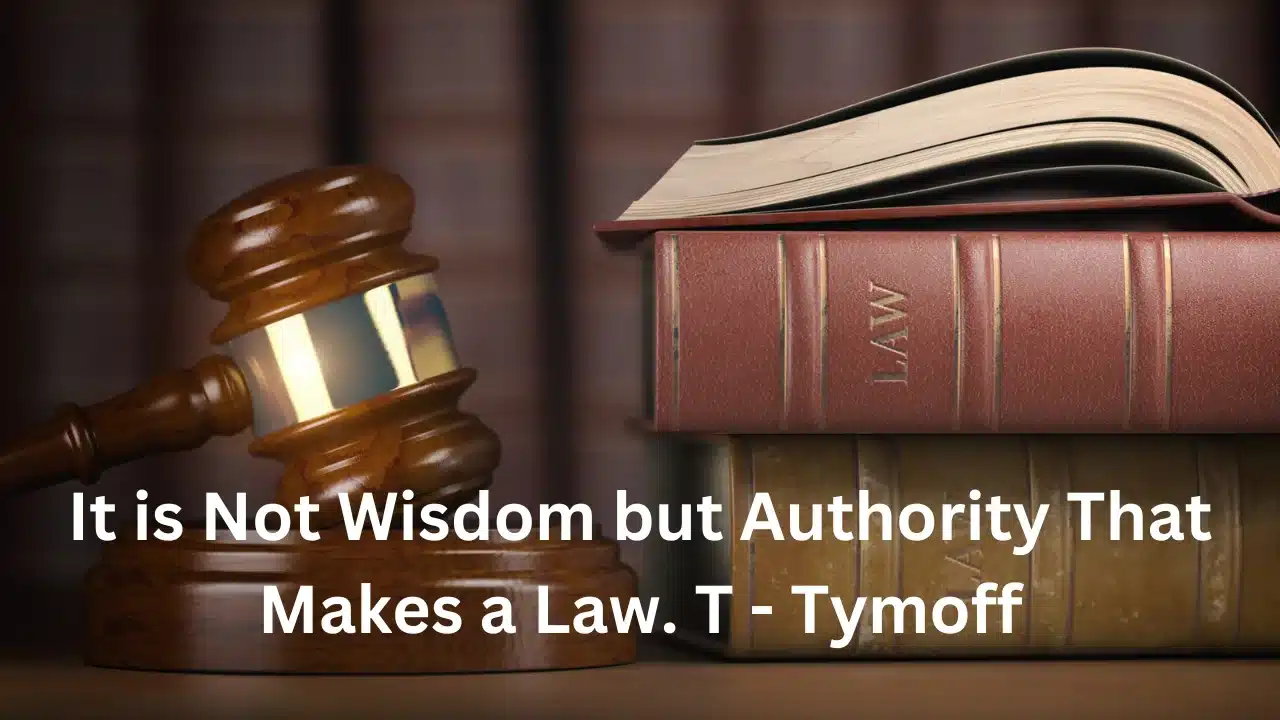In the intricate tapestry of jurisprudence, the relationship between wisdom and authority in the creation of laws has long been a subject of philosophical contemplation and scholarly debate. Attributed to, the aphorism It is Not Wisdom But Authority That Makes a Law. t – tymoff encapsulates this profound interplay, prompting profound reflections on the nature of legal legitimacy and moral authority. This comprehensive article embarks on a journey through historical epochs, philosophical inquiries, and contemporary discourses to unravel the complexities of this intriguing proposition and its implications in the realm of law and governance.
It is Not Wisdom But Authority That Makes a Law. t – tymoff: Historical Evolution
The evolution of legal systems across civilizations offers a rich tapestry of insights into the interplay between wisdom and authority in lawmaking. From the ancient civilizations of Mesopotamia and Egypt, where monarchs wielded absolute authority in decreeing laws, to the democratic experiments of ancient Greece and Rome, where the voices of the citizenry began to shape legislative processes, the historical trajectory of legal development reflects shifting paradigms of power and governance. The emergence of philosophical It is Not Wisdom But Authority That Makes a Law. t – tymoff inquiry in classical Greece, with luminaries such as Socrates, Plato, and Aristotle, laid the groundwork for probing questions about the sources of legal authority and the role of wisdom in crafting just laws.
Understanding the Philosophical Perspectives
Legal Positivism vs. Natural Law Theory
The philosophical It is Not Wisdom But Authority That Makes a Law. t – tymoff debate surrounding the aphorism is anchored in contrasting perspectives, notably legal positivism and natural law theory. Legal positivism asserts that the validity of law derives from its source of authority, such as legislation or judicial pronouncements, rather than its moral or ethical content. In contrast, natural law theory posits that laws must conform to higher moral principles or natural law to be considered valid, irrespective of their source of authority.
Philosophical Contemplations:
The aphorism It is Not Wisdom But Authority That Makes a Law. t – tymoff beckons philosophical reflections on the essence of legal legitimacy and the criteria for just laws. In the annals of philosophical discourse, wisdom embodies a multifaceted concept that encompasses moral discernment, practical reasoning, and a profound understanding of human nature and societal needs. From the moral philosophy of Immanuel Kant, which emphasized the primacy of moral autonomy and rationality in ethical decision-making, to the utilitarian calculus of Jeremy Bentham and John Stuart Mill, which sought to maximize societal welfare through legislative interventions, philosophers have grappled with the complexities of wisdom in shaping legal norms.

Contemporary Perspectives:
In contemporary legal scholarship and discourse, the tension between It is Not Wisdom But Authority That Makes a Law. t – tymoff continues to animate debates on legislative ethics, judicial activism, and the legitimacy of legal norms. Legal positivists, influenced by the theories of John Austin and H.L.A. Hart, assert that laws derive their validity solely from institutional authority, emphasizing the importance of legal rules and procedures over moral considerations. In contrast, proponents of natural law theory, inspired by the works of Thomas Aquinas and John Locke, contend that laws must adhere to transcendent moral principles and natural rights to be considered legitimate. The clash between legal positivism and natural law theory underscores deeper philosophical divides about the foundations of legal authority and the moral underpinnings of law.
Legal Realism and Social Context:
Legal realism injects a dose of pragmatism into the discourse on legal authority, emphasizing the influence of social context, power dynamics, and pragmatic considerations in shaping legal outcomes. Legal realists such as Oliver Wendell Holmes Jr. and Roscoe Pound argued that judicial decisions and legal precedents are not merely the products of abstract legal reasoning but are deeply embedded in social realities and power structures. This sociological perspective highlights the role of judges as social engineers It is Not Wisdom But Authority That Makes a Law. t – tymoff in light of societal values, political dynamics, and economic interests, challenging simplistic notions of legal objectivity and neutrality.
Intersectionality and Legal Pluralism:
An intersectional lens refracts the dynamics of It is Not Wisdom But Authority That Makes a Law. t – tymoff through the prism of diverse social identities and intersecting axes of privilege and oppression. Gender, race, ethnicity, class, sexuality, and other intersecting identities shape individuals’ interactions with the legal system, influencing access to justice, legal representation, and the enforcement of laws. Legal pluralism acknowledges the coexistence of multiple legal systems and sources of authority within a society, recognizing the complex interplay of cultural norms, religious laws, customary practices, and indigenous legal traditions. This pluralistic perspective invites a more nuanced understanding of legal authority as multifaceted and contextual, rather than monolithic and universal.
Contemporary Challenges:
In the contemporary landscape of law and governance, the aphorism It is Not Wisdom But Authority That Makes a Law. t – tymoff resonates with renewed relevance amidst complex geopolitical dynamics, technological disruptions, and socio-economic transformations. Globalization and digitalization have blurred traditional boundaries of legal jurisdiction, raising questions about the applicability of national laws in cyberspace and the regulation of emerging technologies such as artificial intelligence, blockchain, and biotechnology. Moreover, the resurgence of populism, nationalism, and authoritarianism in various parts of the world has sparked debates about the erosion of democratic norms, the rule of law, and the independence of judicial institutions. In this turbulent milieu, the quest for a balance between wisdom and authority in lawmaking assumes paramount significance, as societies grapple with the imperatives of justice, equity, and human rights in the face of evolving challenges.
It is Not Wisdom But Authority That Makes a Law. t – tymoff: Conclusion
The aphorism It is Not Wisdom But Authority That Makes a Law. t – tymoff serves as a timeless beacon for navigating the labyrinthine complexities of legal authority. As we traverse the historical epochs, philosophical inquiries, and contemporary discourses surrounding law and governance, we encounter a rich tapestry of insights into the intricate interplay between wisdom and authority in the formation of laws. While institutional authority plays a pivotal role in the enactment and enforcement of laws, wisdom remains an indispensable compass that guides us in discerning the moral legitimacy and societal impact of legal norms. By embracing the dialectic between wisdom and authority, we embark on a transformative journey towards a more just, equitable, and humane legal order that upholds the inherent dignity and rights of all individuals.
Frequently Asked Questions (FAQs) related to It is Not Wisdom But Authority That Makes a Law. t – tymoff
Q1: What does the aphorism It is Not Wisdom But Authority That Makes a Law. t – tymoff mean?
A1: This aphorism It is Not Wisdom But Authority That Makes a Law. t – tymoff suggests that the legitimacy of a law is derived not from its inherent wisdom or moral correctness but from the authority of the entity or institution that promulgates it.
Q2: How does the historical evolution of legal systems shed light on the interplay between It is Not Wisdom But Authority That Makes a Law. t – tymoff lawmaking?
A2: Throughout history, legal systems have evolved from absolute monarchies to democratic societies, reflecting shifts in power dynamics and the role of wisdom and authority in lawmaking.
Q3: What are some philosophical perspectives on the relationship between It is Not Wisdom But Authority That Makes a Law. t – tymoff in law?
A3: Philosophers have explored the role of wisdom in crafting just laws, with some emphasizing moral autonomy and rationality, while others focus on societal welfare and utility.
Q4: How do contemporary legal scholars approach the debate between wisdom and authority in lawmaking?
A4: Legal positivists assert that laws derive their validity from institutional authority, while proponents of natural law theory argue that laws must adhere to transcendent moral principles to be legitimate.
Q5: What is the significance of legal realism in understanding the dynamics of legal authority?
A5: Legal realists emphasize the influence of social context, power dynamics, and pragmatic considerations in shaping legal outcomes, challenging notions of legal objectivity and neutrality.
Q6: How does intersectionality inform our understanding of legal authority?
A6: Intersectionality highlights how diverse social identities shape individuals’ interactions with the legal system, influencing access to justice and the enforcement of laws.
Q7: What role does legal pluralism play in the discourse on legal authority?
A7: Legal pluralism acknowledges the coexistence of multiple legal systems within a society, recognizing the complex interplay of cultural norms, religious laws, and customary practices.
Q8: What are some contemporary challenges related to the aphorism “It is Not Wisdom But Authority That Makes a Law”?
A8: Globalization, technological disruptions, and socio-economic transformations pose challenges to traditional notions of legal authority, raising questions about jurisdiction, regulatory frameworks, and the erosion of democratic norms.
Q9: How can societies navigate the balance between wisdom and authority in lawmaking in the face of evolving challenges?
A9: Societies must engage in nuanced deliberations that uphold the imperatives of justice, equity, and human rights while navigating the complexities of legal authority in a rapidly changing world.
Q10: What are the implications of embracing the dialectic between wisdom and authority in lawmaking for the future of legal governance?
A10: By recognizing the intrinsic value of wisdom in crafting just laws and the role of authority in enforcing them, societies can strive towards a more just, equitable, and humane legal order that upholds the inherent dignity and rights of all individuals.

Crafting Daily Lifestyle Narratives Across News and Business Horizons
Meet Joseph Tucker, a versatile blogger who navigates the intricate landscapes of lifestyle, news, business, and beyond. With a keen eye for detail and a passion for diverse niches, Joseph’s blogs are a testament to his ability to seamlessly blend lifestyle insights with the latest news and business trends. Whether offering practical lifestyle tips, dissecting current events, or unraveling the dynamics of the business world, Joseph’s writing invites readers to explore a rich tapestry of topics, where every blog post adds a new layer to our understanding of modern living. Mail: [email protected]
